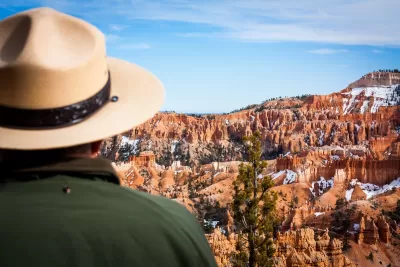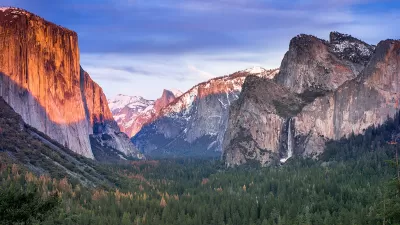Thousands of essential park workers were laid off this week, just before the busy spring break season.

Massive layoffs at the National Park Service will likely have rippling negative effects on communities surrounding national parks and monuments, writes Kurt Repanshek in National Parks Traveler, noting that parks generate billions of dollars in revenue for nearby towns each year.
“Interior Department figures from last summer noted that the National Park System generated $55.6 billion for the national economy in 2023, an increase of $5.2 billion from the year before. The 2023 National Park Visitor Spending Effects survey found that 325.5 million visitors spent $26.4 billion in communities near national parks.” Repanshek adds that this supported 415,400 jobs nationwide, thousands of which are now being cut by the administration.
Phil Francis, chair of the Coalition to Protect America's National Parks, says the move is “hard to understand.” According to Kristen Brengel, senior vice president of government affairs for the National Parks Conservation Association, “Not having those important positions filled would be very harmful to the park itself, and then also problematic with visitor safety and other experience issues.” Many of the workers who were laid off this week performed critical jobs such as wastewater management and trail maintenance. Brengel also expressed concern about the potential privatization of park services, which could lead to poor management and profit-driven policies.
FULL STORY: Trump Administration's Cuts To National Park Service Could Impact Local Communities

Manufactured Crisis: Losing the Nation’s Largest Source of Unsubsidized Affordable Housing
Manufactured housing communities have long been an affordable housing option for millions of people living in the U.S., but that affordability is disappearing rapidly. How did we get here?

Americans May Be Stuck — But Why?
Americans are moving a lot less than they once did, and that is a problem. While Yoni Applebaum, in his highly-publicized article Stuck, gets the reasons badly wrong, it's still important to ask: why are we moving so much less than before?

Research Shows More Roads = More Driving
A national study shows, once again, that increasing road supply induces additional vehicle travel, particularly over the long run.

Which US Rail Agencies Are Buying Zero-Emissions Trains?
U.S. rail agencies are slowly making the shift to zero-emissions trains, which can travel longer distances without refueling and reduce air pollution.

San Diego School District Approves Affordable Housing Plan
The district plans to build workforce housing for 10 percent of its employees in the next decade and explore other ways to contribute to housing development.

Lawsuit Aims to Stop NYC’s ‘City of Yes’ Zoning Reforms
A lawsuit brought by local lawmakers and community groups claims the plan failed to conduct a comprehensive environmental review.
Urban Design for Planners 1: Software Tools
This six-course series explores essential urban design concepts using open source software and equips planners with the tools they need to participate fully in the urban design process.
Planning for Universal Design
Learn the tools for implementing Universal Design in planning regulations.
City of Moreno Valley
Institute for Housing and Urban Development Studies (IHS)
City of Grandview
Harvard GSD Executive Education
NYU Wagner Graduate School of Public Service
City of Cambridge, Maryland
Newport County Development Council: Connect Greater Newport





























